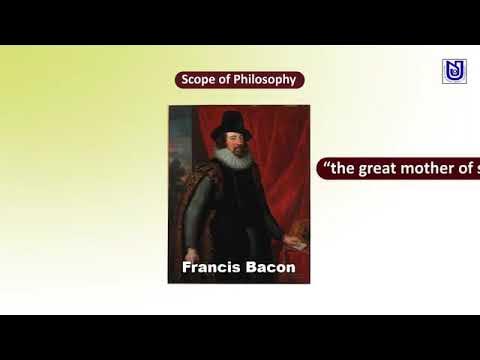Part 2: Philosophy as SCIENCE
Summary
TLDRIn this philosophy class, the instructor explores the meaning and essence of philosophy, focusing on its relationship with science and life. Philosophy is defined as the systematic study of first causes and highest principles using natural reason. The video highlights philosophy's role in understanding fundamental truths, distinct from other sciences, while still intertwined with them. An example of Albert Einstein's theory of relativity is used to illustrate how philosophy and science work together through logical reasoning and curiosity. Philosophy is shown as foundational to various disciplines like mathematics, social sciences, and psychology.
Takeaways
- 📚 Philosophy is the study of the first cause and highest principles of all things, using natural reason and logic.
- 🔍 Philosophy and science are considered equal partners in helping to develop creative thought through systematic investigation.
- 🧠 Philosophy requires logical reasoning and rational justification, which makes it a systematic discipline.
- 🧪 Unlike other disciplines, philosophy does not seek to explain supernatural phenomena but instead relies on reason and evidence.
- 👩🔬 The history of philosophy is closely linked with the natural sciences, as both involve a sense of wonder and logical reasoning to investigate reality.
- 🌌 Albert Einstein's discovery of the theory of relativity is an example of using reasoning and wonder to explore scientific concepts.
- 🚗 Einstein pondered what would happen if a car traveled at the speed of light, leading to his theory that light would appear to freeze at that speed.
- 🕒 Einstein spent ten years proving his theory of relativity using astronomy and technology, demonstrating the importance of reason and evidence in philosophical and scientific exploration.
- 🌍 Philosophy encompasses various fields, such as mathematics, social sciences, economics, psychology, and more, because it deals with the foundational principles of all knowledge.
- 🧐 Philosophy helps to understand the highest principles of reality, which are fundamental to all scientific and intellectual disciplines.
Q & A
What is the etymological definition of philosophy?
-The etymological definition of philosophy refers to the study of fundamental questions about existence, knowledge, values, and reason, using natural light and reasoning.
How is philosophy similar to science?
-Philosophy is similar to science in that both involve systematic investigation. Philosophy uses logical reasoning and rational justification, much like science, to explore fundamental principles.
What is meant by 'philosophy is systematic'?
-Philosophy is systematic because it requires logical reasoning and rational justification. It approaches questions in an organized and structured way, similar to scientific methods.
In what ways does philosophy differ from science?
-Philosophy differs from science because while it shares systematic investigation, it focuses on exploring the first causes or highest principles of all things, whereas science often deals with empirical observation and specific natural phenomena.
How are philosophy and the natural sciences intertwined?
-Philosophy and natural sciences are intertwined because many early philosophers were also scientists, using wonder and reasoning to investigate the natural world. Philosophical reasoning often laid the foundation for scientific inquiry.
Why is philosophy not used to explain supernatural revelations?
-Philosophy relies on natural light and reason to explain things, focusing on rationality and systematic inquiry, whereas supernatural revelations are based on faith or divine intervention, which are outside the scope of philosophical reasoning.
What example involving Albert Einstein is mentioned in the script?
-The script mentions Albert Einstein's thought experiment about what would happen if a car were moving at the speed of light. This question led to the development of his theory of relativity, demonstrating the power of reasoning and curiosity.
What role did reasoning and technology play in Einstein’s theory of relativity?
-Einstein used reasoning and technology, specifically astronomy, to develop and prove his theory of relativity. His sense of wonder, combined with scientific tools, helped him formulate concepts about time and space.
What subjects does philosophy encompass according to the script?
-Philosophy covers all other sciences and disciplines, including mathematics, science, social sciences, economics, and psychology, because it explores the first causes or highest principles behind all these fields.
What is the significance of philosophy in understanding all other disciplines?
-Philosophy is significant in understanding all other disciplines because it explains the foundational or highest principles underlying all fields of study, helping to create a unified perspective on knowledge.
Outlines

Cette section est réservée aux utilisateurs payants. Améliorez votre compte pour accéder à cette section.
Améliorer maintenantMindmap

Cette section est réservée aux utilisateurs payants. Améliorez votre compte pour accéder à cette section.
Améliorer maintenantKeywords

Cette section est réservée aux utilisateurs payants. Améliorez votre compte pour accéder à cette section.
Améliorer maintenantHighlights

Cette section est réservée aux utilisateurs payants. Améliorez votre compte pour accéder à cette section.
Améliorer maintenantTranscripts

Cette section est réservée aux utilisateurs payants. Améliorez votre compte pour accéder à cette section.
Améliorer maintenantVoir Plus de Vidéos Connexes
5.0 / 5 (0 votes)






